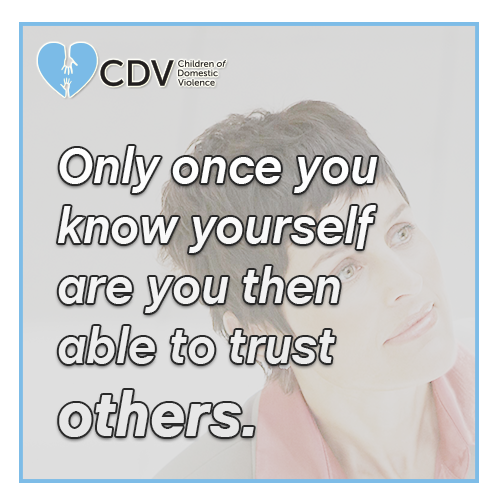We Grew Up Thinking It Was Safer to Be Alone
Children who grow up with domestic violence often learn the lie that it’s safer to be alone. They learn that when you let others into your heart or your home, they can hurt you if they want to. Such children also learn that just because they trust someone doesn’t mean that trust won’t be betrayed. It becomes safer to remain alone.
Many who grew up living with domestic violence don’t even realize they’ve been living this lie of aloneness. Even when surrounded by friends, we see that it is possible to keep intimacy and trust at bay, and never truly let anyone in. We think that we’re forging friendships and perhaps even engaging in intimate relationships, while deep down we don’t trust ourselves to open up to another.
Believing in a lie is dangerous enough. But not knowing that it’s a lie, and not knowing that you’re behaving in alignment with that lie, can be downright devastating to your ability to live a life that you love. Here in this post, we explore how a young woman who appeared to others as open and social was actually deeply mired in a sense of aloneness. We’ll show you how to realize if you, too, believe the lie that it’s safer to be alone.
She Had Everything and Was Surrounded by Love
Eleanor, it seemed, had it all. To look at her, no one would guess how alone she felt. Beautiful and popular, she has always been surrounded by friends. She has a loving boyfriend and even maintains a positive relationship with the parents who raised her, despite having grown up living with domestic violence.
That’s now. Eleanor is a bright, successful, and accomplished individual. But for most of her life, Eleanor struggled to let people in.
“It’s not anyone else’s job to worry about me or take care of me,” she says, “and I know that I can be a lot to deal with. So I try to work through my issues within myself.”
Aloneness and Distrust Can Be Hidden in Plain Sight
As you can see, the lie of aloneness can be hard to detect. Often, when we’re honest with ourselves, we know when we’re angry or when we’re depressed or feeling resentful. But knowing when we’re shutting down or closing off to others, particularly when we’re isolating emotionally but not physically, can be harder to perceive.
Because you had to be strong and self-sufficient as a child growing up with domestic violence, you may see any habitual isolation or distrust of others as simply hardiness and personal strength. It is a strength. But all human beings suffer if they have to be strong all the time.
Identifying It Is the First Step
Don’t be discouraged if you discover that you’ve been isolating yourself or believing the lie that it’s safer to be alone. Knowledge is half the battle. You empower yourself when you acknowledge that your relationships could be deeper, or that you could open up to truly trusting someone. When we stop believing we have to protect ourselves at every turn, we heal another layer of our past and also invite the kind of human connection that can heal us completely.
Are you surprised to find you’ve been isolating yourself physically or emotionally, or have you always noticed your tendency toward aloneness?

